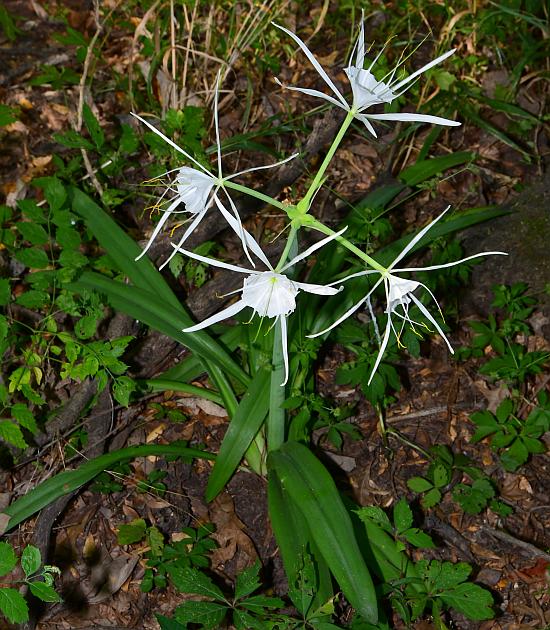Hymenocallis caroliniana (L.) Herb.
Spider Lily

Native
CC = 8
CW = -5
MOC = 9
© SRTurner
Hymenocallis caroliniana (L.) Herb.Spider Lily | |
 |
Native CC = 8 CW = -5 MOC = 9 |
© SRTurner |
|
Family - Liliaceae Habit - Perennial with large, stout bulbs. Stems - Aerial stems erect, to 75 cm, unbranched, glabrous, slightly flattened. Leaves - Basal, to 65 cm, linear and straplike, slightly folded longitudinally, glabrous, often glaucous.
Inflorescences - Terminal at the tips of aerial stems, umbels of 2-6 flowers, subtended by a whorl of 2-6 bracts, these 3-5 cm long, linear to narrowly triangular, white and papery at maturity.
Flowers - Sessile, ascending to spreading. Perianth 12-25 cm long, fused into a narrow tube in the lower half, the lobes linear, spreading, white. Broadly funnelform corona of petaloid tissue 3-4 cm long present inside the perianth lobes at the top of the perianth tube. Stamens 6, fused to the corona. Style 1, slender, the stigma capitate. Ovary inferior, with 3 locules, each with 2 ovules.
Fruits - Ovoid, soft-walled capsules, 15-25 mm long.
Flowering - July - August. Habitat - Swamps, wet bottomland forests. Origin - Native to the U.S. Lookalikes - None. Other info. - This bizarre but beautiful species is found in Missouri only in the bootheel region. Beyond Missouri its range extends southeastward into the Deep South. When flowering the plant is impossible to mistake for anything else in the state. The seeds are relatively large and soft, with the capsules frequently appearing lumpy because of uneven seed development within each locule. The flowers are fragrant, and the plant deserves wider cultivation as a striking addition to the ornamental garden. Photographs taken at Otter Slough Conservation Area, Stoddard County, MO, 7-31-2015, 4-22-2019, 8-15-2021, and 8-07-2022, and Duck Creek Conservation Area, Stoddard County, MO, 8-12-2015 (SRTurner). |